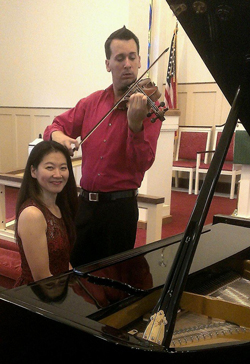by Guytano Parks

Sords delivered the opening Allegro of Elgar’s Sonata, Op. 82, assertively, with drama and passion, and transitioned beautifully into the introspective, lyrical sections with the assistance of sensitive and expert playing by Izumida. Both matched subtle tone colors and expressive inflections.
Elgar dedicated this sonata to a family friend, Marie Joshua, and wrote to her: “I fear it does not carry us any further but it is full of golden sounds and I like it, but you must not expect anything violently chromatic or cubist.”
Sords gave the Andante an improvisatory feel with long, lyrical lines at first, contrasting that with some jaunty phrases and harmonic surprises later. He played with a deep, penetrating tone before launching into the playful and rhythmic Allegro, non troppo finale. The duo’s repeating of poignant, sequential phrases toward the closing of this movement conveyed a sense of affirmation. Elgar quotes the dolcissimo melody from the slow movement just before the coda of this final movement as a tribute to Marie Joshua, who died four days after receiving his letter. One wonders why this sonata, brimming with beauty and deep emotion, never had a reputation of one of Elgar’s great works.
A masterful grasp of the gypsy spirit, rife with radiant tone, fiery character and an exciting display of bravado with exotic violin effects distinguished the performance of Bartók’s six short Romanian Folk Dances. Izumida again matched Sords expertly, apparently sharing the same gypsy blood.
After intermission came Elgar’s Salut D’Amour, Op. 12. Sords and Izumida played this brief, popular piece lovingly, allowing the music to flow naturally by not overdoing its inherent sentimentality.
Originally written for flute and guitar, Piazzolla’s Histoire du Tango conveys the history and evolution of the tango in four movements: Bordel – 1900, Cafe -1930, Nightclub -1960 and Concert d’aujourd’hui. The pianist echoed the violinist’s phrases by coyly tapping out rhythms on the piano case in the light opening piece, played with grace and a feeling of high spirits. The mood became dark and brooding in the second piece, then an optimistic, lighter section contrasted before settling back again into the dark mood.
The third piece was rhythmic and melodramatic, then melted into a sentimental, reflective section before returning to the rhythmic character of the beginning. The most adventurous and modern of the set, the last piece reflected the influence of Bartók, Stravinsky and other composers. It was obvious that both Sords and Izumida relished in this set of colorful and entertaining tangos as they conveyed the composer’s depictions of many moods and scenes.
The Carmen Fantaisie Brillante, Op. 3 by Hubay, unlike the more familiar Carmen Fantasy by Sarasate, is “a relatively unknown work which includes a greater amount of thematic material from the opera by Bizet than Sarasate’s,” Sords said in his spoken program notes. It proved to be a brilliant, virtuosic showpiece. Sords impressed with his total command of technique, consummate musicianship and bravura as he tossed off scads of notes and sang out like a diva in this operatic tour du force. Firm and colorful support by Izumida enhanced the performance.
Sords and Izumida had the enthusiastic and appreciative audience in the palms of their hands all afternoon and the duo rewarded them with two encores:the etude-like Souvenir d’Amerique, Op. 17 (Yankee Doodle) by Vieuxtemps, and Leroy Anderson’s Plink, Plank, Plunk!, “played pizzicato without the bow because my bowing hand is too tired after all this playing,” Sords quipped.
Published on ClevelandClassical.com October 15, 2013
Click here for a printable version of this article.


